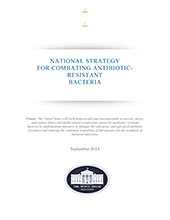Antimicrobial Resistance, MenAfriNet
Division of Bacterial Diseases (DBD) News Bulletin - Fall 2014
November 7, 2014: Content on this page kept for historical reasons.
In This Issue
Antimicrobial Resistance

Executive Order to Combat Antibiotic Resistance
On September 18, 2014, President Obama signed an Executive Order directing key Federal departments and agencies to take action to combat the rise of antibiotic-resistant bacteria. The Administration also released its National Strategy on Combating Antibiotic-Resistant Bacteria. In addition, the President’s Council of Advisors on Science and Technology (PCAST) released a related report on Combating Antibiotic Resistance. The Administration announced a $20 million prize, co-sponsored by the National Institutes of Health and the Biomedical Advanced Research and Development Authority, to facilitate the development of rapid, point-of-care diagnostic tests for healthcare providers to identify highly resistant bacterial infections.
The Executive Order signed by President Obama directs Federal departments and agencies to implement the National Strategy and address the PCAST report. The National Strategy provides a five-year plan for enhancing domestic and international capacity to: prevent and contain outbreaks of antibiotic-resistant infections; maintain the efficacy of current and new antibiotics; and develop and deploy next-generation diagnostics, antibiotics, vaccines, and other therapeutics. The PCAST report provides actionable recommendations from the President’s Council, in consultation with experts from the public and private sectors, for combating antibiotic resistance.
Antimicrobial Resistance Budget Initiative
The FY15 budget proposal includes an increase of $30 million for CDC’s Detect and Protect Against Antibiotic Resistance initiative to enhance surveillance and laboratory capacity to detect antibiotic resistance threats and protect patients from imminent danger. Antibiotic resistance is a rapidly growing threat that undermines the successful delivery of most clinical interventions nationally and globally. Without an effective response to this threat, not only are current treatment options for infectious diseases jeopardized, but the effectiveness of new interventions, surgeries, treatments, and effective intensive care unit care are put at risk. For some infections, it is already a post-antibiotic world.
DBD’s Get Smart: Know When Antibiotics Work program plays a critical role in CDC’s strategy to combat antimicrobial resistance. Additional resources from this funding initiative could amplify the program’s research and intervention efforts. Most critically, the initiative will invest in direct action by implementing proven, evidence-based interventions that reduce the emergence and spread of antibiotic-resistant pathogens and improve appropriate antibiotic prescribing.
New Meningitis Surveillance Network in Africa
- Page last reviewed: November 7, 2014
- Page last updated: November 7, 2014
- Content source:


 ShareCompartir
ShareCompartir